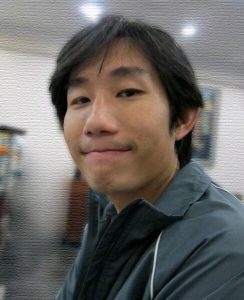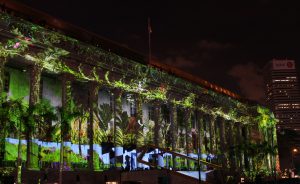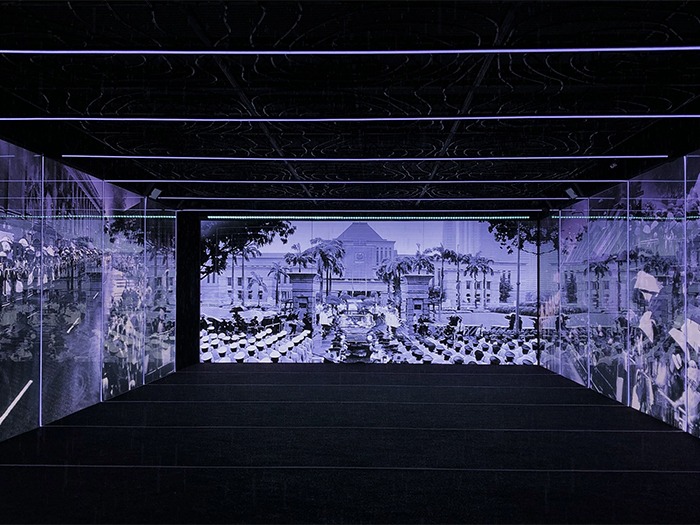Singapore’s Bicentennial Experience could hardly have been more successful. Conceived to illustrate milestones in the island’s history, it employed a rich mix of immersive audio-visual solutions, from the large-scale to the intimate. Originally aiming for 300,000 visitors, by the time of its close at the end of 2019, its remarkable creative storytelling had attracted an incredible 760,000.
Behind that success was show design specialist Ctrl Fre@k, Low used the power and versatility of Hippotizer to realise the multitude of solutions. A founding partner of Ctrl Fre@k along with Jeffrey Yue, Low is one of Singapore’s leading experts in video and lighting control solutions, a long-time Hippotizer user and a member of Green Hippos’s Key User Support Programme (KUSP).

Wee’s career path had its beginnings in 2002, when he worked for a time as a theatre technician for a local theatre company. “I had very little knowledge of the industry,” he said, “but I thought it could be a fun career.”
With his interest in show technology sparked, he moved to Singapore’s then brand-new arts centre, Esplanade – Theatres on the Bay. Assigned as operator to lighting programmer Ben Davis for the opening production, Low had a valuable, if intensive, opportunity to learn lighting programming from an expert. “I would sit behind Ben daily,” he said. “He was kind enough to answer my questions, give me tips and tricks. That really encouraged me to build a proper foundation for my programming skills.”
Low set about self-learning other consoles, and his obvious aptitude opened new opportunities. It also opened a door to the world of multimedia and media servers. Hired as a lighting programmer for Robert Wilson’s In The Evening At Koi Pond, for Japan’s 2005 EXPO, Low arrived on-site to find his programming remit expanded to include multimedia.
“Before this, I’d only programmed media playback through a lighting console once,” he recalled, “so it was a big leap. The multimedia component consisted of a huge water screen and four projectors. The lighting console was used for overall show control, including water jets, lighting, media servers, mist and automation. I had no knowledge of projection and soft-edge blending. I was taught how to align the image and blending from a media server via the console. That was how I began exploring media server programming.”
Exploration led him to Green Hippo and its Hippotizer Media Servers. In 2008, he took advantage of a European tour to check in for HippoSchool in London. He has been an enthusuastic Hippotizer user ever since. Not long after, in 2010, Ctrl Fre@k was born when Low and Jeffrey Yue were asked to troubleshoot a control system. With Hippotizer in its toolkit, the company has gone from success to success, creating lighting and multimedia systems for countless theatre shows, installations and more.
Discussing Hippotizer’s standout advantages, Low said, “First, the ZooKeeper GUI is very well designed, with all attribute controls easily accessible. Hippotizer V4 gives the flexibility to customise our workspace, which definitely speeds up programming and operation. Second, V4 maintains the 2D workflow from V3: for many simpler productions, users don’t need to build a 3D stage in the software before starting programming. But if a production requires 3D mapping, we can add SHAPE into the workflow and begin working in a 3D environment.”
Drilling down into the detail of his own working practices, Low pointed to Hippotizer’s LiveMask feature as an important aid to creativity. “Being able to just draw and mask any area on the projected surface makes working with sets with irregular shapes so simple,” he said. “I always advise designers not to worry too much about unwanted areas, as the masking is done easily in the software. Not having this masking built into the original content is often helpful, because set pieces can turn up with slight differences in dimensions from those originally specified.”
Another go-to feature for Low is the MultiController. “It’s one of the important tools that I use frequently. Being able to map Pins for external control as well as controlling external devices allows endless possibilities.”

Hippotizer helped Low with one of his most challenging projects – a 2015 façade mapping show, Share The Hope, for the National Gallery Singapore’s opening festival. “With the building’s complex structure and the projectors’ positions, we had to provide a playback system that could handle high-res content and allow us to mend the shadowed areas with images,” he said. “I’d been working in 2D environments in media servers and the need to mend shadowed areas on this scale made workflow difficult. But the Green Hippo team introduced me to SHAPE and the 3D workflow, which helped to simplify the entire task.”
Another challenge, in 2018, introduced him to Hippotizer’s powerful integration with Notch generative effects. “A theatre play, I Came At Last To The Seas, had several projection surfaces that would fly in and out for various scenes,” he said. “For some scenes there was also a need for live feed with effects and generative content. We put together a system with a Boreal Media Server, Notch and a PTZ camera.”
Initially, only a trailing image effect was needed for the live feed. “Zep Mouris from Green Hippo helped us build the effect into the software and it worked great. Then the designer requested generative content, and we looked to Notch for the solution. It was our first time trying it, and running it in Hippotizer, and the integration was easy.”
Now with the success of 2019’s Bicentennial Experience also on its résumé, Ctrl Fre@k has a powerful reputation both at home and internationally, and with support from the Green Hippo team whenever it’s needed, they are prepared for even the biggest challenges.
“Being part of the KUSP group allows me to discuss queries about projects easily,” said Low. “There’s always someone I can approach. With learning new features in the software, I can get updates quickly. The Green Hippo team are constantly checking in, making sure you’re in good shape with their products.”


